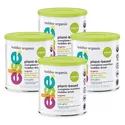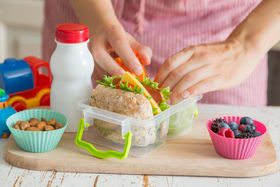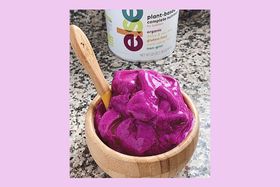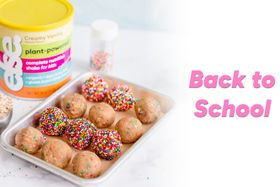How to Feed Your Toddler
Updated October 11, 2024

The toddler years, from the ages of 1 to 3 years old are an important period for your child’s growth and development. Any parent of a toddler will tell you that suddenly their child has become very active, curious, and seems to be constantly growing, almost overnight. Early childhood is a critical period for establishing food preferences and dietary habits. Regularly offering your child nutritious foods will help increase the likelihood that they will prefer these foods long term.
You want to be sure your child is getting the proper nutrition they need, but you may wonder what types of foods and in what quantities are necessary to support their exponential growth. Moreover, food safety is also a concern for toddlers, so you should stay clear of potential choking hazards. Finally, if you have a picky eater, it can feel frustrating when you are offering a variety of foods that are left untouched.
Feeding your toddler can feel complicated and overwhelming. But, with the right knowledge and guidance, you can put your mind at ease and offer the very best nutrition for your child.
Toddler Food - What and How Much?
Just like adults, toddlers need a balanced diet with plenty of variety in order to meet their nutritional needs. However, during the toddler years there are a few nutrients in particular that are more critical:
Calcium
Calcium is essential for the development of strong bones, teeth, and muscles. Providing enough calcium-rich food sources in your toddler’s diet will ensure they meet their needs. Foods rich in calcium are dairy such as milk, yogurt, and cheese. Other foods that contain calcium in lesser amounts include green leafy vegetables and broccoli as well as legumes like beans, lentils, and peas.
Toddlers require 700mg of calcium per day, which equals 2-3 servings of high calcium foods. One serving equals 1 cup of dairy milk, soy milk or yogurt, or 1.5 ounces of cheese.
Vitamin D
Vitamin D is another essential nutrient for your child, and works closely with calcium to help build strong bones and teeth. It also plays a role in preventing heart problems and bone disease later in life. Research also demonstrates vitamin D’s potential in supporting our immune system.
The majority of our vitamin D comes from sun exposure. Our bodies naturally convert vitamin D to its active form from the sun’s UV rays. Bringing your child outdoors regularly and offering vitamin D-rich foods can help them maintain normal vitamin D levels.
Foods that naturally contain vitamin D include fatty fish like salmon, mushrooms, cod liver oil, and tuna. Fortified foods and beverages contain vitamin D in lesser amounts - such as fortified milk, yogurt, and orange juice.
Toddlers need 600 IU (International Units) per day of vitamin D, which equals around 3 cups of milk, orange juice, or 3-4 oz of salmon.
Iron
Iron is an essential nutrient used by the body to make hemoglobin, a protein in red blood cells that helps deliver oxygen throughout your body. If your child’s diet is lacking in iron, they are more at risk for anemia which can cause weakness, learning and behavioural issues, and social withdrawal.
Iron-rich foods include meats such as liver, beef, dark chicken or turkey meat, beans, spinach, and fortified cereals and grains. To boost iron absorption, it is recommended to consume vitamin-C containing foods with iron-containing foods.
Toddlers require 7-10mg of iron per day, which equals around 1 cup of fortified cereal or raw spinach.
Vitamin A
Vitamin A plays an important role in your child’s health. It supports vision, bone health, and protects the body from infections. It also promotes the health and growth of hair, nails, and skin.
Vitamin A-rich foods include colourful vegetables such as carrots, squash, sweet potato, and spinach.
Toddlers require 300 mcg of vitamin A per day. Just 1 raw carrot provides more than the daily vitamin A requirements for your child.
Vitamin C
Vitamin C is critical to your child’s health for many reasons. It provides skin protection, aides in wound healing, and supports the brain and nervous system. Additionally, it may show promise in boosting the immune system.
Vitamin C-rich foods include citrus fruits such as oranges, lemon, and lime, orange juice, as well as red bell peppers, broccoli, and kale. The daily vitamin C recommendation for toddlers is 300-400mg, about the amount in 2 cups of orange juice. However, orange juice can contain a good amount of added sugar.
Food Safety Tips and Choking Hazards
While many foods are encouraged during the toddler years, it is important to also understand certain foods can pose a potential choking risk. Until at least 3 years old, it is suggested to have your toddler stay away from the following foods even if they have all their teeth:
- Raw carrots, or any large pieces of raw veggies
- Whole tomatoes
- Grapes
- Hot dogs
- Tough meats
- Whole peanuts
- Chunky peanut butter
- Seeds
- Popcorn
- Chips
- Gum
- Hard Candy
Additionally, make sure your child is sitting upright when eating and that you remain alert during meals to prevent choking.
Managing Picky Eaters
While a varied diet can assure your child gets the best possible nutrition, the reality is that most toddlers are picky eaters and may not eat much variety on a regular basis. They are active, frequently distracted, and want to exert their independence.
It is important to remember that if it feels like your child is not open to trying new foods, that this is normal. It can take multiple exposures (sometimes more than 20!) of a particular food before your child starts to like it. While this is common, it can still be nerve-wracking as the parent.
It can help to present foods in different ways, shapes, or forms. If it is an unfamiliar food, serving a small, bite-sized portion can be less intimidating to your child and can increase the likelihood that they will try it.
If you feel like you keep offering healthy foods to your child and they are resisting, a nutrient-rich, vegan toddler beverage like Else’s can help to meet their needs. Else’s Toddler beverage can supplement the important nutrients that your child may be lacking in their diet, especially iron, to bring added peace of mind.
The content and advice provided in this article is for informational purposes only and is not a substitute for medical diagnosis, treatment, advice for specific medical conditions. Always consult a pediatrician to understand the individual needs of your child.









